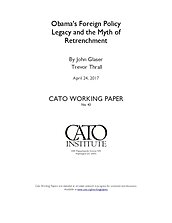The extent to which Trump will actually depart from this expansive global role of foreign policy activism remains to be seen. Early signs suggest that the bureaucracy, institutional checks, and bipartisan consensus on this grand strategy are moderating Trump’s fitful dissension, resulting in something that looks very close to traditional U.S. foreign policy. As a result, Trump’s bark may prove to be much worse than his bite.
Obama’s Foreign Policy Legacy and the Myth of Retrenchment
The election of Donald J. Trump jolted the Washington, D.C. foreign policy community. Though erratic and habitually self-contradictory, Trump seemed to be the first man elected president since World War II to explicitly question America’s role in the world. Although Republicans and Democrats spend a lot of time criticizing each other, foreign policy leaders have generally agreed on the broad strokes of American strategy over the past 70 years. Both parties have supported the steady expansion of free trade, the promotion of regional stability through American military and diplomatic activism, and the maintenance of the “liberal world order” established in the wake of World War II. The consensus around this grand strategy, known loosely as primacy or liberal hegemony, accelerated after the terrorist attacks of September 11, 2001, at which point political leaders used fears of terrorism to justify an even more interventionist and militaristic approach to foreign policy.


